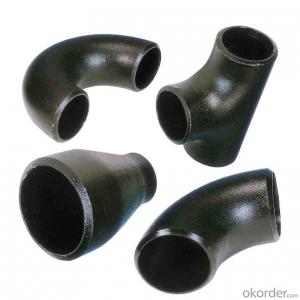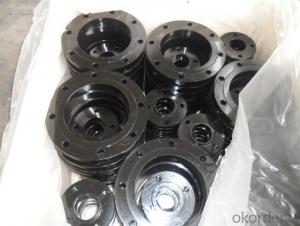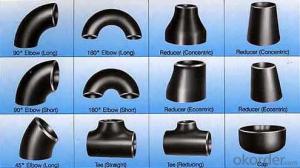CARBON STEEL PIPE FITTINGS ASTM A234 TEE 3''
- Loading Port:
- Tianjin
- Payment Terms:
- TT OR LC
- Min Order Qty:
- 5 m.t.
- Supply Capability:
- 30000 m.t./month
OKorder Service Pledge
OKorder Financial Service
You Might Also Like
Specifications
1.we produce seamless steel pipe
2.size:48-219*4.5-45mm
3.ISO 9000 approved
4.Market:south/east Asia,Mid-east,South America
seamless steel pipe
Material J55 K55 N80 L80 P110.etc
Standard ASTM JIS
Usage conveying oil gas ,oil pipe line,pipe material collar,oil nature gas,
Packing wooden cases or wooden pallet ,export standard package
Others:Special design available according to requirement
Anti-corrosion available and high temperature resistence
Delivery time 30days
Payment term T/T L/C
Name | API oil casing pipe | ||||
Out Diameter | Wall thickness | Material | Thread | Length | |
in | mm | ||||
5 1/2 | 139.7mm | 6.20 | J55/K55/N80 | LTC/STC/BTC | R2 |
6.98 | |||||
7.72 | |||||
9.17 | |||||
10.54 | |||||
6 5/8 | 168.28mm | 7.32 | J55/K55/N80 | LTC/STC/BTC | R2 |
8.94 | |||||
10.59 | |||||
12.06 | |||||
12.06 | |||||
8 5/8 | 219.08 | 8.94 | H40 | S/L/B | 9 5/8R2 |
J55/K55 | S/L/B | ||||
10.6 | L80 | L/B | |||
12.7 | L80 C95 | L/B | |||
14.15 | P110 | L/B | |||
9 5/8 | 244.48 | 13.84 | J55 K55 | R2 | |
15.11 | L80 | L/B | |||
10 3/4 | 273.05 | 11.43 | J55 K55 | S/B/E | R2 |
13.84 | P110 | S/B | |||
15.11 | P110 | S/B | |||
11 3/4 | 298.45 | 12.19 | J55 K55 | S/B | R2 |
10.96 | J55 K55 | S/B | |||
13 3/8 | 339.72 | 12.19 | J55 K55 L80 | S/B | R2 |
10.92 | J55 K55 | S/B | |||
13.06 | L80 | S/B | |||
Coupling and thread can be required according to customer requirment
- Q:How are steel pipes used in the manufacturing of heat exchangers?
- Steel pipes are commonly used in the manufacturing of heat exchangers due to their excellent heat transfer properties and durability. They are utilized as the main components for carrying and transferring hot or cold fluids within the heat exchanger system. The steel pipes ensure efficient heat exchange by providing a smooth and continuous flow of the fluid, while also withstanding high temperatures and pressures. Additionally, steel pipes are often preferred for their corrosion resistance, making them suitable for various industrial applications requiring reliable and long-lasting heat exchangers.
- Q:SC15 what does galvanized steel pipe look like?
- Ordinary galvanized steel pipe, the outer diameter is 1.5 inches
- Q:How are steel pipes installed underground?
- Steel pipes are installed underground through a process called trenching, where a trench is dug in the ground according to the desired pipe route. The trench is then prepared by removing any hindrances and ensuring a level base. The steel pipes are laid into the trench, with proper alignment and connections between sections. Once in place, the trench is backfilled with soil, compacted, and any necessary restoration work is done on the surface.
- Q:Can steel pipes be used for chemical storage tanks?
- The utilization of steel pipes for chemical storage tanks is contingent upon the specific application and the composition of the chemicals in question. Steel, being a robust and enduring material, is generally well-suited for a multitude of industrial purposes. Nevertheless, certain chemicals have the potential to corrode steel, thereby compromising the tank's integrity. In such instances, it is imperative to employ corrosion-resistant coatings or linings on the steel pipes to safeguard against chemical reactions. Furthermore, adherence to industry standards and regulations during the tank's design and construction is crucial to guarantee the safe storage of chemicals. Consequently, while steel pipes can indeed be deployed for chemical storage tanks, meticulous consideration must be given to the nature of the chemicals being stored, and appropriate measures must be taken to prevent corrosion and ensure safety.
- Q:What's the difference between straight steel pipe and seamless steel pipe?
- Observe whether there is weld seam. Welded pipe without treatment, there are obvious weld, there are bulges, like scars. A better point will shave off the weld, but there is a distinct difference between the eye and the eye. Also a small number of pipe will be processed after cold rolling, surface roughness and accuracy are relatively high, may be counterfeit seamless pipe sales. Careful observation will still show that the pipe wall will have a continuous spiral, metal luster slightly brighter, that is, the original welding seam, metallographic structure and other parts of the difference. To tell the truth, the layman would have to observe that it might be a little difficult.
- Q:What's the material of Q325 steel pipe?
- Q235 refers to the material yield stress of 235MPa carbon steel, because of its low price, good machining and welding performance, it is generally used for welding structural parts. Of course, the unimportant parts can be used for it.
- Q:Can steel pipes be used for transporting sewage?
- Yes, steel pipes can be used for transporting sewage. Steel pipes are commonly used in sewage systems due to their durability, strength, and corrosion resistance, making them suitable for carrying wastewater and sewage over long distances.
- Q:How are steel pipes used in the aerospace manufacturing industry?
- Steel pipes are commonly used in the aerospace manufacturing industry for various applications. They are primarily used for the construction of aircraft structures, such as fuselages, wings, and landing gear. Steel pipes offer excellent strength and durability, making them suitable for withstanding the extreme conditions experienced during flight. Additionally, they are used in the aerospace industry to transport fluids, such as fuel and hydraulic systems, due to their ability to handle high pressure and temperature. Overall, steel pipes play a critical role in ensuring the safety, reliability, and performance of aircraft in the aerospace manufacturing industry.
- Q:What are the advantages of using steel pipes in the manufacturing industry?
- There are several advantages of using steel pipes in the manufacturing industry. Firstly, steel pipes are known for their strength and durability, making them suitable for handling heavy loads and withstanding high pressures. Secondly, steel pipes have excellent corrosion resistance, which ensures a longer lifespan and reduces the need for frequent replacements. Additionally, steel pipes offer a smooth interior surface, allowing for efficient fluid flow and minimizing friction losses. They are also highly versatile, as they can be easily fabricated and customized to meet specific requirements. Finally, steel pipes are environmentally friendly, as they are recyclable and contribute to sustainable manufacturing practices.
- Q:There are multiple welded galvanized steel pipe outer diameter 108mm wall thickness 4mm length of 6 meters
- Formula for calculating weight of welded steel pipe:Kg/m= (outside diameter mm-, wall thickness mm) * wall thickness mm*0.02466= (108-4) *4*0.02466=10.26 kg / MBecause of galvanizing, the weight is heavier than that of ordinary welded pipe 3%~6%.Therefore, the length of 6 meters galvanized steel pipe weighs about 10.26*6*1.06=65 kilograms
1. Manufacturer Overview |
|
|---|---|
| Location | |
| Year Established | |
| Annual Output Value | |
| Main Markets | |
| Company Certifications | |
2. Manufacturer Certificates |
|
|---|---|
| a) Certification Name | |
| Range | |
| Reference | |
| Validity Period | |
3. Manufacturer Capability |
|
|---|---|
| a)Trade Capacity | |
| Nearest Port | |
| Export Percentage | |
| No.of Employees in Trade Department | |
| Language Spoken: | |
| b)Factory Information | |
| Factory Size: | |
| No. of Production Lines | |
| Contract Manufacturing | |
| Product Price Range | |
Send your message to us
CARBON STEEL PIPE FITTINGS ASTM A234 TEE 3''
- Loading Port:
- Tianjin
- Payment Terms:
- TT OR LC
- Min Order Qty:
- 5 m.t.
- Supply Capability:
- 30000 m.t./month
OKorder Service Pledge
OKorder Financial Service
Similar products
New products
Hot products
Related keywords






























